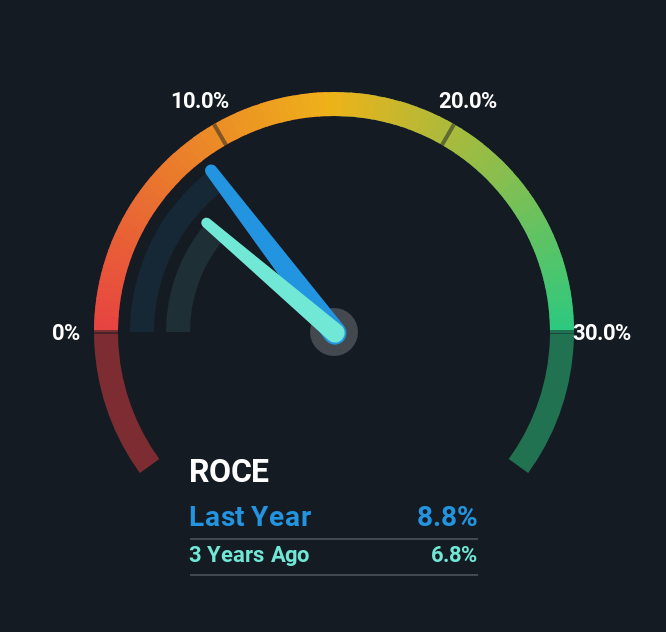Did you know there are some financial metrics that can provide clues of a potential multi-bagger? Firstly, we'd want to identify a growing return on capital employed (ROCE) and then alongside that, an ever-increasing base of capital employed. Put simply, these types of businesses are compounding machines, meaning they are continually reinvesting their earnings at ever-higher rates of return. Although, when we looked at discoverIE Group (LON:DSCV), it didn't seem to tick all of these boxes.
Return On Capital Employed (ROCE): What Is It?
For those that aren't sure what ROCE is, it measures the amount of pre-tax profits a company can generate from the capital employed in its business. Analysts use this formula to calculate it for discoverIE Group:
Return on Capital Employed = Earnings Before Interest and Tax (EBIT) ÷ (Total Assets - Current Liabilities)
0.088 = UK£44m ÷ (UK£695m - UK£196m) (Based on the trailing twelve months to March 2025).
So, discoverIE Group has an ROCE of 8.8%. Ultimately, that's a low return and it under-performs the Electrical industry average of 13%.
See our latest analysis for discoverIE Group

In the above chart we have measured discoverIE Group's prior ROCE against its prior performance, but the future is arguably more important. If you'd like to see what analysts are forecasting going forward, you should check out our free analyst report for discoverIE Group .
How Are Returns Trending?
There are better returns on capital out there than what we're seeing at discoverIE Group. The company has employed 51% more capital in the last five years, and the returns on that capital have remained stable at 8.8%. Given the company has increased the amount of capital employed, it appears the investments that have been made simply don't provide a high return on capital.
The Bottom Line On discoverIE Group's ROCE
In conclusion, discoverIE Group has been investing more capital into the business, but returns on that capital haven't increased. And investors may be recognizing these trends since the stock has only returned a total of 9.1% to shareholders over the last five years. So if you're looking for a multi-bagger, the underlying trends indicate you may have better chances elsewhere.
If you're still interested in discoverIE Group it's worth checking out our FREE intrinsic value approximation for DSCV to see if it's trading at an attractive price in other respects.
If you want to search for solid companies with great earnings, check out this free list of companies with good balance sheets and impressive returns on equity.
New: AI Stock Screener & Alerts
Our new AI Stock Screener scans the market every day to uncover opportunities.
• Dividend Powerhouses (3%+ Yield)
• Undervalued Small Caps with Insider Buying
• High growth Tech and AI Companies
Or build your own from over 50 metrics.
Have feedback on this article? Concerned about the content? Get in touch with us directly. Alternatively, email editorial-team (at) simplywallst.com.
This article by Simply Wall St is general in nature. We provide commentary based on historical data and analyst forecasts only using an unbiased methodology and our articles are not intended to be financial advice. It does not constitute a recommendation to buy or sell any stock, and does not take account of your objectives, or your financial situation. We aim to bring you long-term focused analysis driven by fundamental data. Note that our analysis may not factor in the latest price-sensitive company announcements or qualitative material. Simply Wall St has no position in any stocks mentioned.
About LSE:DSCV
discoverIE Group
Designs, manufactures, and supplies specialist electronic components for industrial applications in the United Kingdom, Europe, North America, Asia, and internationally.
Solid track record with adequate balance sheet and pays a dividend.
Market Insights
Community Narratives




